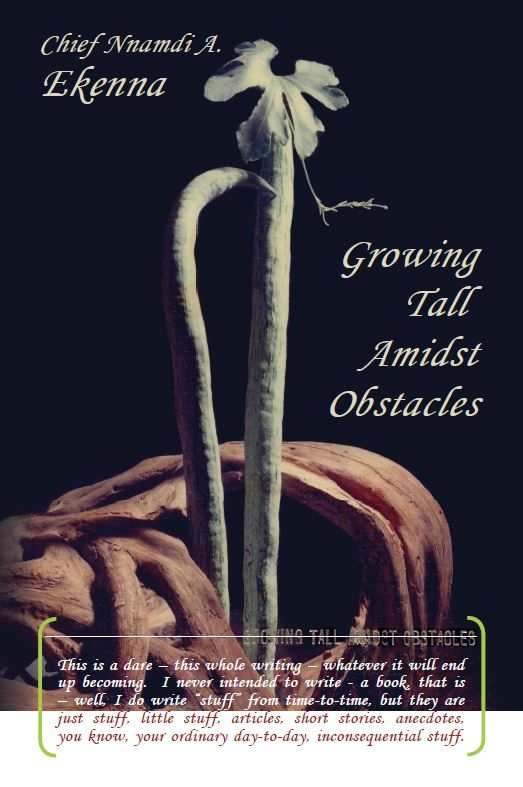Growing Tall Amidst Obstacles
Fascinating details of a polygynous family, immigration, and being a lawyer give Ekenna’s insights intriguing context.
This book suggests that to live is to encounter individuals and circumstances with solemnity, grace, and reflection. A lawyer who immigrated to the United States from Nigeria, Chief Nnamdi A. Ekenna offers details about his experiences with various family members, cultures, and countries all while sharing his critique of language use in print and visual media, in Growing Tall Amidst Obstacles.
Ekenna was born into a large polygynous family that his brother, the author of the foreword, compares to gumbo: “We come with a variety of talents.” Their father suggested careers for each of his children; lawyer was reserved for Ekenna, who did not always take full advantage of educational opportunities. His upbringing was both unique because of his family structure and typical in terms of his youthful curiosity and response to the world around him. Like most children, he and his siblings did not fully grasp the ramifications of the Nigerian Civil War, but while residing in a safe village during the thirty months of unrest, he did develop a better understanding of his parentage, particularly his paternal grandfather’s undertakings.
After an introduction explaining that he wrote the book in response to a dare, Ekenna begins to critique the language used in recent television commercials, an authorial move that seems premature, as he has not fully introduced himself, established credibility, or attempted to gain the confidence of the reader. The volume continues in a disconnected manner using unorthodox punctuation and organization.
Ekenna offers a few interesting passages filled with description, humor, and dialogue that emphasize what it means to grow up with eighteen siblings and several mothers; to endure the Nigeria-Biafra War with the support of family; to study law; and to be a loving son, brother, and uncle. These interesting autobiographical details are buried under poorly organized material and digressions about loosely related matters.
Often a chapter title suggests one topic, but the meandering details lead the reader to wonder how the information given is connected. After opening a chapter with details about his father’s funeral, the next section is labeled “The Gavel.” It includes a lengthy critique on society’s neglect of common courtesies, information about holidays, and details about a friend’s hardships before finally offering a touching story about how Ekenna’s niece sent him a gavel with money from her first paycheck.
While the subheadings throughout are helpful, the repetitive use of italics, bold, and fully capitalized words is distracting and difficult to interpret. Readers interested in immigration stories, tales about reflecting on living one’s life, or observations about a variety of topics will want to mine the book for the gems, such as the moments when Ekenna suggests how to honor others, develop self-pride, and give and receive random acts of kindness.
Reviewed by
Kaavonia Hinton
Disclosure: This article is not an endorsement, but a review. The publisher of this book provided free copies of the book and paid a small fee to have their book reviewed by a professional reviewer. Foreword Reviews and Clarion Reviews make no guarantee that the publisher will receive a positive review. Foreword Magazine, Inc. is disclosing this in accordance with the Federal Trade Commission’s 16 CFR, Part 255.

